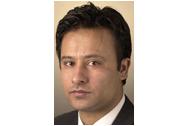By Hadi Fornaji.

Tripoli, 17 August:
Despite its high-profile humanitarian response during the revolution, some Libyans seem to have forgotten what this organisation . . .[restrict]had achieved and are asking why it is still here, said the new chief of the International Committee of the Red Cross in Libya, Ishfaq Muhamad Khan.
“People may be suspicious about us,” admitted Khan, “The ICRC’s presence is still new, and despite a broad and highly visible humanitarian response during the conflict, several months down the road, some people may have forgotten what we have done or they may wonder what we are still doing in the country.”
In the last three months there have been five attacks on Red Cross premises in Benghazi and Misrata, causing the organisation to suspend its activities in both cities. Khan said that it was imperative that the Red Cross considered the risks to its local staff, comprising 130 Libyans and 50 expatriates.
“The most recent attack, early on 5 August in Misrata, was particularly appalling.” He said “Our residence was directly and repeatedly hit with heavy weapons by an unknown group. The security of our staff is a priority for us.
“We regret that we had to take this decision, especially as this means that we will not be able to respond to the humanitarian needs of the Libyan population in those areas for a certain period of time.
Khan declined to speculate on who had been behind the attacks, pointing out that the Red Cross had not been alone in being targeted in what he said was a deteriorating security situation: “In such a complex situation, it might be a combination of factors that have led to these incidents.It is important for us to understand why this happened in order to be able to take whatever measures are necessary for us to be accepted by all. In such a complex situation, it might be a combination of factors that have led to these incidents.
“It is important for us to understand why this happened in order to be able to take whatever measures are necessary for us to be accepted by all.”
Khan said that in recent months there had been a “flare-up” of mistrust and misunderstandings, in which foreign organisations were suspect.
” We know that some in the country don’t see the difference between the ICRC and what they perceive to be ‘Western agencies’.”
He continued: “In addition, there tends to be a misperception about what the ICRC logo represents. As it features a cross, the ICRC is sometimes wrongly seen as a Christian organisation. We need to explain that the emblems of the International Red Cross and Red Crescent Movement have no religious significance.
“As an example, in Indonesia, the biggest Muslim country in the world, there is a Red Cross Society rather than a Red Crescent Society. One of the main purposes of these emblems is to clearly identify humanitarian staff, buildings and vehicles and therefore to protect them. In Afghanistan, Palestine and in many other conflict zones where we have had a long presence, our red cross emblem is well recognised by the population and the numerous armed groups, and it helps us to move around and to enter dangerous or sensitive areas. In Libya, for the time being, this is not the case.”
In May, the Brigades of the Captive Sheikh Omar Abdulrahman in Libya asserted that the Red Cross had been seeking to convert Libyans to Christianity and more recently had claimed that it was handing out bibles in Tawergha refugees in Benghazi.
Khan said that the Red Cross firmly denied such allegations.
“ The ICRC is not involved in any kind of political or religious activities, neither in Libya nor in any other country in the world. The ICRC is a neutral and impartial organisation with an exclusively humanitarian role.
We do our utmost to protect the lives and dignity of victims of armed conflict and other situations of violence and to provide them with assistance, no matter who they may be. How could we achieve such humanitarian goals if we were taking sides?
“The ICRC is totally distinct and independent from the United Nations and any State or faith-based organisation. It employs people of many nationalities and religions and works in more than 80 countries all over the world. Most of our operations currently take place in predominantly Muslim countries, many of them in the Arab world, because that is where the need for humanitarian aid is currently greatest.”
Khan went on to make the point that the Red Cross was operating in Libya with the full consent of the authorities with whom a memorandum of understanding was signed at the end of March 2012.
Khan pointed out that the Misrata and Benghazi offices have not been closed formally and the Red Cross hoped to resume its activities in the cities as soon as conditions permitted. Meanwhile it continued to work in the west and the south of the country.
He concluded: “Being accepted and well perceived by the Libyan population, authorities and leaders and by all armed groups, offers the best protection of all. In order to achieve this, we will intensify our dialogue and communication with all concerned, focusing, as a matter of priority on parts of society that have or could have misperceptions about us.” [/restrict]










